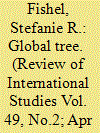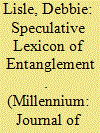|
|
|
Sort Order |
|
|
|
Items / Page
|
|
|
|
|
|
|
| Srl | Item |
| 1 |
ID:
185108


|
|
|
|
|
| Summary/Abstract |
Climate change adaptation is a key shared endeavour of our time. In Thai Binh Province of Vietnam, rice farmers have been adapting to environmental change for generations and have developed sophisticated strategies of paying attention to non-human entities. Such strategies stand in stark contrast to modernist, developmentalist climate change adaptation interventions prioritising mastery and control over the environment. In this article, we think about farmers and other species ‘surviving well’ in the context of climate change adaptation in Thai Binh. We examine the strategies for adaptation already present and the implications of such strategies for climate change adaptation approaches in Vietnam and further afield. We argue that local practices of listening to non-human entities and imagining them as kin can challenge modernist developmentalist approaches to adaptation, providing innovative locally appropriate adaptations. Beyond this, such practices can lead the way in developing non-exploitative and mutually beneficial relationships in ‘more-than-human’ ecological communities for long-term survival.
|
|
|
|
|
|
|
|
|
|
|
|
|
|
|
|
| 2 |
ID:
193306


|
|
|
|
|
| Summary/Abstract |
Forest ecosystems are crucial to survival on Earth. This article argues that trees and forests are both vital components of a healthy Earth system and productive examples for expanding International Relations’ disciplinary boundaries. The article discusses the forest in three contexts: the global, the (post)colonial, and from the tree itself. From tree planting as a practice of social and environmental justice, to postcolonial and Indigenous science and knowledge, to the mycorrhizal ‘wood wide web’, a focus on trees, forests, and biosphere opens the possibility for a multispecies IR. Through a consideration of trees and forests in law, treaty, culture, and science at the local and global level, this article adds to a growing literature in IR that strives to bring the non-human, more-than-human, or other-than-human creatively and productively into the discipline. Foregrounding the forest's materiality and trees’ symbolic power for human cultures opens important pathways to understanding how the non-human is, and should, alter and affect global politics.
|
|
|
|
|
|
|
|
|
|
|
|
|
|
|
|
| 3 |
ID:
182448


|
|
|
|
|
| Summary/Abstract |
This intervention offers a speculative lexicon to help students and scholars of global politics think critically and creatively about entanglement. It is neither definitive nor complete, but instead offers some possible points of entry into a contested field. It mobilises two particular claims: (1) that entanglement always involves both human and non-human entities; and (2) that entanglement is always emergent and in process. As a whole, this speculative lexicon is intended to help us sense the moment when entanglements intensify in ways that render them stable; attune to these durabilities in order to analyse their constitutive logics of inclusion/exclusion; acknowledge our own irrevocable entanglement in these logics; care for those bodies, lifeworlds, species and habitats that are targeted or abandoned by such logics; and craft mutual projects to disrupt, disaggregate and re-route these logics. Because entanglements are always emerging, dissipating and reconvening, the practice of navigating this open terrain is disorienting and often frustrating. We may desire a final destination where entanglements solidify and horizons magically appear, but giving in to that desire reproduces the violence of enclosure. This lexicon is offered as a way to keep the political terrain of entanglement open so we can collectively ensure that contestation remains a possibility.
|
|
|
|
|
|
|
|
|
|
|
|
|
|
|
|
|
|
|
|
|